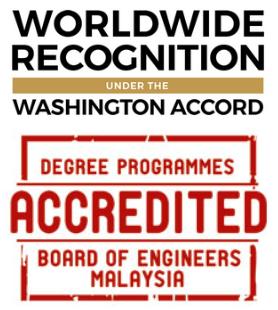-
About APU
Why choose APU?
Malaysia’s Premier Digital Tech UniversityNo.1 for International Students in Malaysia (QS World University Ranking 2025)5-Star Excellence Rating (SETARA)100% Employability RateRanked No.16 for International Students in the WorldMore than 80,000 Graduates & AlumniDual Degree
APU-DMU Dual Degree Programme
Students who are under Bachelor’s Degree Programme will have the option to opt-in for the APU-DMU Dual Degree Scheme. Under this Scheme, students will receive 2 Degree Certificates & Transcripts upon graduation: 1 from Asia Pacific University (APU), Malaysia and 1 from De Montfort University (DMU), UK.Learn MoreInternational Recognition
Engineering Degrees Accredited Under The Washington Accord
APU Engineering Degrees are fully accredited by the Board of Engineers Malaysia (BEM) which is a signatory to the Washington Accord.
This accreditation ensures that APU Engineering Graduates will have the following benefits in countries who are signatories of the Washington Accord:
- Opportunities to register as a Graduate Engineer with Board of Engineers Malaysia (BEM) or the relevant professional bodies in other countries who are signatories under the Washington Accord.
- Pathways to becoming a Professional or Chartered Engineer.
- Assurance that graduates are considered as having met international academic standards for engineering practice.
For more information, please click HERE.
Requirements
Admission Requirements
General RequirementsDirect Entry to Level 1 of the DegreeSTPM- 2 Passes in STPM with a minimum Grade C (GP 2.0) in Mathematics and Physics (or Chemistry), and a Credit in Mathematics and Physics (or Chemistry) at SPM Level or its equivalent.
A-Level- 2 Passes (Grade A-D) in A-Level including Mathematics and Physics (or Chemistry).
UEC- 5 Grade B’s in UEC, including Mathematics and Physics (or Chemistry).
Matriculation/ Foundation- Passed the relevant Foundation programme (minimum CGPA of 2.0) with a Credit in Mathematics and Physics (or Chemistry) at SPM/O-Level/IGCSE or equivalent.
Direct Entry to Level 2 of the DegreeDiploma- Successful completion of the APU/APIIT Engineering Diploma and fulfilment of requirements for Credit Transfer, subject to the approval of the APU Academic Board OR
- Successful completion of a Diploma in Engineering with other recognised Institutions and fulfilment of requirements for Credit Transfer, subject to the approval of the APU Academic Board.
Any qualification that APU accepts as equivalent to the above.Note: The above entry requirements may differ for specific programmes based on the latest programme standards published by Malaysian Qualifications Agency (MQA). The qualification and entry requirements for the programmes will be determined based on the “Comparison List of Equivalency of International Qualifications with SPM (O-Levels equivalent) and STPM (A-Levels equivalent)“ published by Malaysian Qualifications Agency (MQA).Candidates who wish to study Engineering Degree course must not be color blind or physically handicapped which makes him/her unable to conduct experimental/practical work and affect the learning process leading to potential errors towards professional practice as well. This is in line with the requirements of engineering professional bodies where safe engineering practices is mandatory. All International Students need to go through EMGS Medical Screening, if the student is found to be color blind; the Medical Screening maybe failed.
English RequirementsInternational Students- IELTS : 5.0
- TOEFL IBT : 40
- Pearson (PTE) : 47
- MUET : Band 3.5
For more information please click HERE
Engineering @ APUPEO & PLO
-
Programme Educational Objectives
- Be a practicing engineer contributing to the development of Computer or Electronic Engineering while demonstrating professionalism.
- Pursue engineering innovation via career advancement opportunities and/or advanced studies in Computer or Electronic Engineering.
Computer engineering has emerged as a driving force addressing numerous global demands like smart grids, cognitive buildings, energy management and the likes. Operating platforms for more and more applications have been migrating to the cloud in recent days. Bridging the gap between hardware and software, are Computer Engineers, advancing computer technology towards transforming more and more of these cyber dreams into realities. Some of the areas covered in this major are:
- Digital Logic Design
- Computer Networks
- Embedded and Desktop Operating Systems
- Microcontroller Selection and Programming
- Signal Processing
-
Programme Learning Outcomes
Programme OutlineWhat We Teach
This programme is specifically designed to provide students with:
- High-quality undergraduate engineering education by providing students with a curriculum that is firmly grounded in Computer engineering fundamentals.
- A study in the area of computer engineering which covers networking, database management, security systems, cloud infrastructure and data analytics.
-
Degree Level 1
Students will understand the basic principles of engineering in the areas of Circuit Analysis, Instrumentation & Measurement, C Programming, Programming with Python, Engineering Materials, Engineering Design and Networking. Other modules aim to provide the basic demands of employers, as well as thorough grounding in principles of IT and entrepreneurship. Important and relevant skills for managing activities and for their own independent learning are also introduced.
Common Modules
- Instrumentation & Measurement
- Engineering Materials
- Programming with Python
- Engineering Mathematics 1
- Introduction to C Programming
- Engineering Mathematics 2
- Analysis of Circuits
- Fundamentals of Entrepreneurship
Specialised Modules
- Introduction to Networking
Degree Level 2
Here, students start specialising in modules that develop the necessary underlying knowledge and skills in Computer Engineering with modules such as Electromagnetic Field Theory, Engineering Software & Applications, Analogue Electronics, Digital Electronics, Signals & Linear Systems, Introduction to Electrical Systems, Object Oriented Development with Java, Programming Concepts in C++ and Human Computer Interaction. Engineering Mathematics is provided for better understanding of the engineering modules.
Common Modules
- Digital Electronics
- Introduction to Electrical Systems
- Engineering Mathematics 3
- Engineering Software & Applications
- Innovation Process
- Analogue Electronics
- Electromagnetic Field Theory
- Signals & Linear Systems
Specialised Modules
- Human Computer Interaction
- Object Oriented Development with Java
- Fundamentals of Integrated Circuits Design
Degree Level 3
Specialised knowledge and skills in the areas of Control Engineering, Communication Engineering Principles, VLSI Design, Microprocessor Systems and Embedded Software, Digital Signal Processing, Modern Communication Systems and Machine Vision & Intelligence are the critical focus of this level. There is further development of the ability to apply relevant engineering skills with strong critical thinking and analysis. Independent learning continues in all modules.
Common Modules
- Control Engineering
- Engineering Mathematics 4
- Communication Engineering Principles
- Venture Building
- Microprocessor Systems & Embedded Software
- Digital Signal Processing
- Engineering Project Management
Specialised Modules
- Modern Communication Systems
- VLSI Design
- Analogue Integrated Circuits & Systems
In the 2nd Semester of Year 3 Minor/ Extension Pathway (Choose 1)
- Choose 1 module from Minor Pathway OR Extension Pathway as a continuation from the module selected in Year 3 Semester 2 as described in the Table below.
Internship (16 Weeks)
Students will undertake an Internship/Industrial Training for a minimum period of 16 weeks to prepare them for a smooth transition from the classroom to the working environment.
Degree Level 4
The final year Engineering modules provide the necessary industry application and technological skills which become very useful for employment upon graduation. Students’ personal and professional development, technical capability and understanding of how to innovate, generate and manage the creation of new ideas will be enhanced. Students will deliver several Engineering Projects where they will demonstrate higher level critical thinking, analysis and solutions development skills which will enhance their employability.
Common Modules
- Project Phase 1 (Investigation)
- Group Design Project 1
- Project Phase 2 (Implementation)
- Engineer in Society
- Group Design Project 2
Specialised Modules
- Computer Systems Security
- User Experience
Minor / Extension Pathway (Continuation)
- Choose 1 module from Minor Pathway OR Extension Pathway as a continuation from the module selected in Year 3 Semester 2 as described in the Table below.
Computer Engineering Minor/Extension Pathways
Future Proof Engineers for the Real World
In APU, employment and it’s continual sustainability is of paramount importance to us. The range of minor and extensions offered to all students within the School of Engineering will craft a formidable way forward for the young aspiring engineers of tomorrow. These options allow students to embark on a journey of exploration either within the engineering fraternity by extending into greater depth (extensions) niche knowledge, skills and attributes required for the practice of contemporary engineering or explore wider options (minor) that are pivotal in the fundamental proliferation of the engineering profession as a while when coupled with other current multidisciplinary fields of expertise. Successful completion of either pathways future proof the students allowing them to embark on a journey of rewarding careers within an engineering discipline of their choice.
Minor Pathway – Gain breadth of knowledge by taking 3 set modules outside of a particular major field of study. There are minor packages available undertaken from Year 3 Semester 2 Year 4 Semester 1 and Year 4 Semester 2.
MINOR PATHWAY
NAME OF MINOR Year 3 Semester 2 Year 4 Semester 1 Year 4 Semester 2 Digital Age Psychology Industrial & Organizational Psychology Cyberpsychology Human Factors Psychology Extension Pathway – Expand depth of knowledge by taking three (3) set modules in a specific area within a certain field of study. There are extensions available undertaken from Year 3 Semester 2, Year 4 Semester 1 and Year 4 Semester 2.
EXTENSION PATHWAY
NAME OF EXTENSION Year 3 Semester 2 Year 4 Semester 1 Year 4 Semester 2 Cloud Computing Designing and Developing Applications on Cloud Cloud Infrastructure and Services Emergent Technology IoT Knowledge Discovery and Big Data Analytics Internet of Things: Concepts and Applications Emergent Technology FinTech FinTech Governance, Risk Management & Compliance Digital Finance Robo Advisor Digital Transformation Digital Execution Digital Strategy & Analytics Emergent Technology Data Analytics Knowledge Discovery and Big Data Analytics Behavioral Science and Marketing Analytics Optimization & Deep Learning Artificial Intelligence Machine Vision Intelligence (MVI) Text Analysis & Sentiment Analysis Emergent Technology MQA Compulsory Subjects*
- Appreciation of Ethics and Civilisation (M’sian Students)
- Malay Communication Language (Int’l Students)
- Philosophy and Current Issues
- Workplace Professional Skills
- Integrity and Anti-corruption
- Co-Curriculum
(*All students are required to successfully complete these modules as stipulated by the Malaysian Qualification Agency.)
-
Countries
-
Universities
-
Courses
-
Exams
-
Resources
-
Services
















